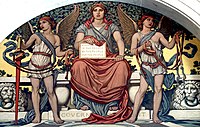
Photo from wikipedia
ABSTRACT This study examines the association between firm’s tax avoidance activities and cost of equity capital across 17 countries. Consistent with the prior study based on the U.S. evidence, within… Click to show full abstract
ABSTRACT This study examines the association between firm’s tax avoidance activities and cost of equity capital across 17 countries. Consistent with the prior study based on the U.S. evidence, within strong investor protection countries, the extent of firm’s tax avoidance is negatively associated with its cost of equity capital. This result indicates that strong investor protection induces investors to perceive firm’s tax avoidance activities as the results of efficient tax planning to reduce tax liabilities. To the contrary, we find that the extent of firm’s tax avoidance is positively associated with its cost of equity capital within weak investor protection countries. This result suggests that investors impose equity risk premium on firm’s tax avoidance activities in weak investor protection countries, where agency conflicts prevail more on firm’s tax avoidance activities. As the first international study on the association between firm’s tax avoidance activities and its cost of equity capital, this study contributes to the literature by suggesting that such an association may vary across countries depending on the strength of investor protection within each country of domicile.
Journal Title: Applied Economics
Year Published: 2019
Link to full text (if available)
Share on Social Media: Sign Up to like & get
recommendations!